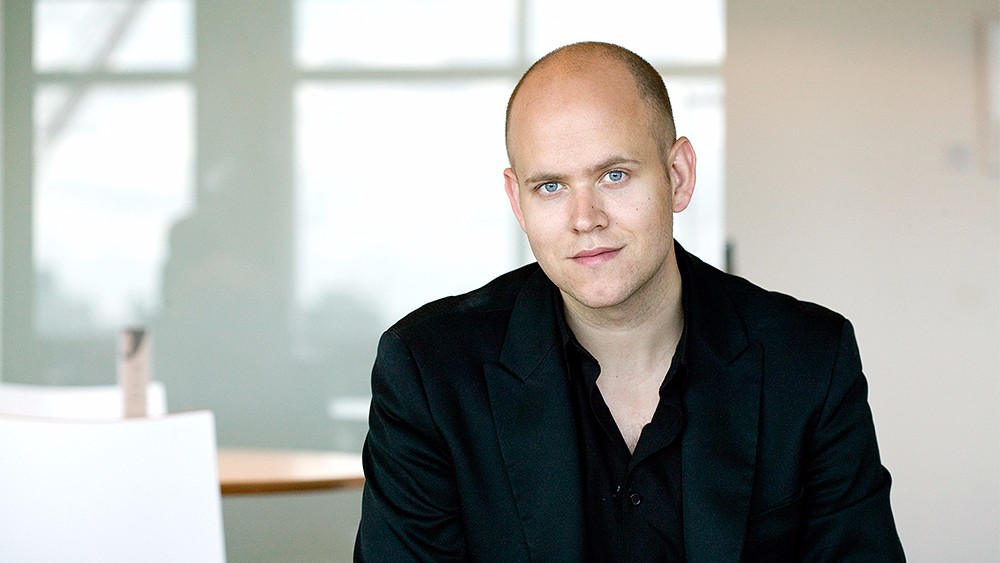The Swedish media, Breakit, have interviewed Daniel Ek, Founder of Spotify, about why he is not worried about Spotify’s losses, the future of the pharmaceutical industry, what he thinks about the lack of women in startup companies and the lack of housing opportunities in Stockholm.
It has been a few years since Daniel Ek lined up for a longer interview with the Swedish media, but now he has made an exception.
The Swedish media, Breakit, managed to catch him during a pause during Women in Tech, a big tech event in Stockholm, with over 600 people attending. Spotify was one of the main sponsors of the event.
Daniel Ek has changed the business foundation of the music industry, together with his friend and co-founder, Martin Lorentzon. After talking with him, you realize that he is planning to change another multi-billion dollar industry.
Daniel was careful to point out that in his current situation, he only have time for Spotify and his family, but in the long run he would like to venture into the pharmaceutical industry.
“Healthcare is an area that intrigues me, especially the interaction between technology and psychology. It is interesting how we can use different measurement methods, to change human behavior,” explained Daniel Ek, CEO and founder of Spotify.
The future of healthcare
Daniel Ek envisions that drugs in the future will be tailored to each individual’s DNA, which opens up for amazing new types of medications.
“In about 15 to 20 years we will look back on the pharmaceutical industry, and think it was some sort of witchcraft. We are going to have so much more knowledge in this area,” said Daniel Ek and continued:
“Today’s healthcare is based upon fixing us when we are sick. In the future, we will be fixing you before you get sick! This shift will move trillions of dollars.”
Daniel Ek states that there has been too little innovation in the health sector, but that is going to change, as more and more tech entrepreneurs’ focus on the health sector.
“The thing that is going to happen to the pharmaceutical industry is that it will cross-pollinate the tech industry, and that is when real innovation occurs.”
It is obvious that he has thought much about these mechanisms in a more general sense.
“Only when you put different interdisciplinary branches together, is it possible to create new ideas. Many people ask me how you create ideas, but they are already mistaken by asking that question. There does not exist a single example in history, that someone has created an entirely new idea,” expressed Daniel Ek and followed up:
“Innovation is about combining two or more concepts in a new context. If you approach innovation that way, it will be much easier for you to get new business ideas.”
No reason to worry about losses
The growth of Spotify is still going strong. The company currently has over 15 million paying customers, which indicates a yearly revenue at around SEK 1.6 billion. The company’s losses remain high.
Spotify’s latest annual report showed a loss of SEK 525 million for 2013, and the year before that the loss was 790 million. This is to no concern of Daniel Ek, as it seems to fit completely with his long-term plan for the company.
“We are focusing on growth at the moment. We have a situation where people’s behavior is changing from buying physical CDs to streaming music via the internet. We are talking about a growth measured in 100’s of percent each year.”
However, it is not a change that develop overnight. Daniel estimates that around 2.5 billion people listen to music every day in some form, and only a minority of them does so through streaming.
“If you combine all online services, then you have about half a billion users on a monthly basis. This gives a pretty good indication of our potential, and we are growing faster than the market as a whole,” says Daniel Ek.
The United States is the world’s largest music market, in which Spotify now has established itself as one of the big players. However, Daniel Ek looks towards the East, when he talks about emerging markets.
“The United States still takes a big part of my focus, but China is also super interesting. People tend to overlook China, because they are looking towards the US and Silicon Valley,” says Daniel Ek and exemplifies with the Chinese companies, Alibaba Group and Tencent.
“They are as large as Facebook, both in term of numbers, users and revenue. I visit China a couple times a year, and every time I get blown away by how far they have come.”
Spotify needs gender equality
A survey done by Breakit, showed that the biggest Swedish tech companies was lagging behind, when it comes to gender equality. Spotify is no exception. The company has no women in any of the key management positions, and the board only consist of men.
Daniel EK recognizes that he, as president of one of the largest tech companies, has failed in that regard,
“All of us tech companies are bad at this area, and it is something we need to become better at. That is also one of the reasons behind our involvement in events of this kind.”
Daniel Ek points out that an equal management is a fundamentally business-critical issue for Spotify:
“Women are half of our targeted audience, and therefore it cannot just be men who works on the product. We need to get more even distribution, especially in our senior positions.”
In addition to sponsoring various events, Spotify also has a special trainee program with focus on highlighting women.
“The program is a way to include more women in our senior positions. We also help distribute the leadership scholarship ‘Female Economist of the Year’ along with Stockholm School of Economics.”
The housing situation in Stockholm
Martin Lorentzon, co-founder of Spotify, has recently reached out to the media and criticized the lack of housing in Stockholm, and Daniel Ek agrees with his criticism:
“It is a much bigger problem than you would expect. We have about 50,000 to 60,000 people moving to Stockholm every year, while we only build around 15,000 homes.”
Daniel Ek states that it is clear that there is a problem here, and that it is not only a problem for the technology industry but also for the entire community. He draws parallels to the situation in San Francisco:
“They have a similar problem with housing, which has created a big inequality where low-income people have less opportunity for housing, and the technology companies are paying more and more for the apartments.”
Spotify’s Stockholm office currently has full-time staff who are just working on acquiring housing for the company’s employees.
“We have our own housing agents, and rent the entire rental property, it is not ideal, but we are forced to do so, because the current housing situation is so difficult,” says Daniel Ek that in the present time has upwards of 800 people working in Spotify’s Stockholm office.
This article is written based on an interview done by Breakit.se. You can find the original article here!
 Nordic Startup News Early Stage Startup News From The Nordics
Nordic Startup News Early Stage Startup News From The Nordics


